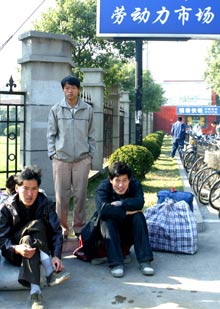Chinese cities and towns are expected to absorb about 300 million people from
rural areas in 20 years if the urbanization drive maintains a growth of 1 per
cent annually.

Migrant workers stay outside a job market
in Ningbo [newsphoto/file] |
The massive
migration of rural labourers will contribute greatly to the development of
cities, Liu He, vice-minister of the Office of the Central Leading Group of
Financial and Economic Affairs, said yesterday.
The urbanization rate currently stands at 1.4 per cent, which means that
about 20 million farmers become urban residents each year.
Statistics from Liu's office indicate that nearly 40 per cent of farmers'
annual per capita income last year, about 3,200 yuan (US$395), was earned in
cities.
But China faces many problems in its urbanization drive, such as low wages
and lack of social security for migrant labourers, Liu told the 2006 China
Development Forum organized by the State Council Development and Research
Centre.
To protect the rights of migrant workers, barriers such as the household
registration system (or hukou) must be removed, suggested Justin Yifu Lin, an
economics professor at Peking University.
Liu said China would adopt a step-by-step reform of its decades- old hukou
system but suggested that the "green card" system practised in Shanghai and some
other cities which enables long-term inhabitants to obtain urban hukou be
adopted in more cities.
In 2003, about 110 million surplus labourers left the farming sector; and 61
per cent of the migrant workers, or 69.1 million, worked in cities, Liu said.
In Wuxi of East China's Jiangsu Province, for example, about 1.5 million of
its 6 million population are from elsewhere. And 100,000-150,000 newcomers
settle down in the city each year, he said.
The maximum population the city can accommodate is 8 million, Liu said. "It
faces huge pressures on environment, resources, especially water, in the next 10
years."